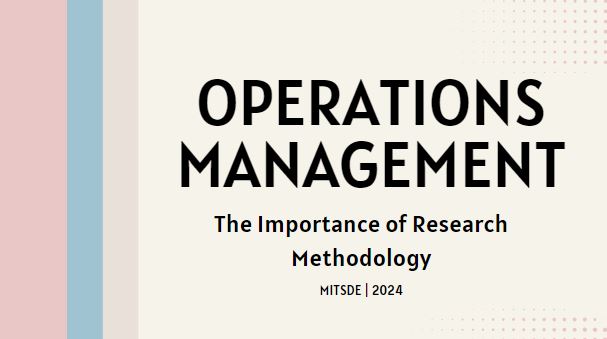
Research plays a crucial role in keeping up with these changes and driving innovation. Whether you’re a student pursuing an Online PGDM in Logistics and Supply Chain Management or a professional looking to enhance your skills, understanding research methodology in operations management is essential.
Understanding Research Methodology in Operations Management
What is Research Methodology?
Research methodology is the systematic approach to collecting, analyzing, and interpreting data to answer specific research questions or test hypotheses. In operations management, it provides a framework for investigating various aspects of organizational processes, supply chain dynamics, and logistics management.
Types of Research Methods in Operations Management
Quantitative Research Methods
- Surveys and questionnaires
- Statistical analysis
- Mathematical modeling
- Simulation studies
Qualitative Research Methods
- Case studies
- Interviews
- Focus groups
- Observational research
Mixed Methods Research
- Combining quantitative and qualitative approaches
Each method has its strengths and weaknesses, and the choice of method depends on the research question, available resources, and the nature of the problem being investigated.
The Role of Research in Operations Management
Research in operations management serves several critical purposes:
- Identifying best practices
- Solving complex operational problems
- Improving efficiency and productivity
- Driving innovation in supply chain and logistics
- Enhancing decision-making processes
For students pursuing an Online PGDM in Logistics and Supply Chain Management, engaging with research helps develop critical thinking skills and provides exposure to real-world challenges.
Critical Areas of Research in Operations Management
Supply Chain Optimization
Supply chain optimization is a crucial area of research in operations management. It involves studying various aspects of the supply chain to improve efficiency, reduce costs, and enhance overall performance. Some key research topics in this area include:
- Inventory management techniques
- Demand forecasting models
- Transportation network design
- Supplier selection and evaluation
- Risk management in supply chains
Students in Online PGDM programs focusing on Logistics and Supply Chain Management often explore these topics through case studies and research projects.
Sustainable Operations
With increasing awareness of environmental issues, sustainable operations have become a significant focus of research in operations management. This area explores how organizations can reduce environmental impact while maintaining operational efficiency. Key research topics include:
- Green supply chain management
- Circular economy principles in operations
- Sustainable logistics practices
- Waste reduction and recycling in manufacturing
- Energy-efficient operations
Understanding these concepts is crucial for students and professionals, as sustainability is becoming a core component of modern operations management.
Technology Integration in Operations
The rapid advancement of technology has opened up new avenues for research in operations management. Some exciting areas of study include:
- Internet of Things (IoT) in supply chain management
- Artificial Intelligence and Machine Learning applications in operations
- Blockchain technology in supply chain transparency
- Big Data analytics for operational decision-making
- Robotics and automation in warehousing and logistics
For those pursuing an Online PGDM in Logistics and Supply Chain Management, staying updated on these technological trends is essential for future career prospects.
Conducting Research in Operations Management: A Step-by-Step Guide
Step 1: Identifying the Research Problem
The first step in any research project is to identify a problem or question within operations management that must be addressed. This could be a gap in existing knowledge, a practical problem organizations face, or an opportunity to improve current practices.
Step 2: Literature Review
Once the research problem is identified, the next step is to conduct a thorough literature review.
This involves:
- Searching academic databases and journals
- Reviewing relevant books and articles
- Identifying fundamental theories and concepts
- Understanding the current state of knowledge in the field
A comprehensive literature review helps refine the research question and avoid duplication of existing work.
Step 3: Choosing the Research Design
The next step is to select an appropriate research design based on the research question and the insights gained from the literature review.
This could be:
- Experimental design
- Survey research
- Case study approach
- Action research
The choice of research design will depend on the nature of the problem, available resources, and the type of data required.
Step 4: Data Collection
Data collection is a critical phase of the research process. Depending on the chosen research design, data collection methods may include:
- Administering surveys or questionnaires
- Conducting interviews or focus groups
- Analyzing company records or industry data
- Observing operational processes
For students in Online PGDM programs, this phase often involves collaborating with industry partners or using simulated datasets.
Step 5: Data Analysis
Once the data is collected, it will be analyzed using appropriate statistical or qualitative analysis techniques. This may involve:
- Descriptive statistics
- Inferential statistics
- Thematic analysis for qualitative data
- Data visualization techniques
Data analysis aims to extract meaningful insights that address the research question.
Step 6: Interpreting Results and Drawing Conclusions
The final step in the research process is to interpret the results of the data analysis and draw conclusions.
This involves:
- Relating the findings to the original research question
- Comparing results with existing literature
- Identifying practical implications for operations management
- Suggesting areas for future research
For students and professionals alike, this step is crucial in demonstrating the value and relevance of the research conducted.
The Impact of Research on Operations Management Practice
Research in operations management has a significant impact on real-world practices. Some ways in which research influences the field include:
- Improving decision-making processes
- Developing new tools and techniques for operations management
- Identifying emerging trends and challenges in the industry
- Bridging the gap between theory and practice
- Enhancing the effectiveness of operations management education
For students pursuing an Online PGDM in Logistics and Supply Chain Management, understanding the practical applications of research is essential for future career success.
Challenges in Operations Management Research
While research in operations management offers numerous benefits, it also comes with its own set of challenges:
- Rapidly changing business environment
- Complexity of global supply chains
- Data availability and quality issues
- Balancing academic rigor with practical relevance
- Ethical considerations in research
Addressing these challenges requires a collaborative effort between academia and industry and continuous adaptation of research methodologies.
Conclusion: The Future of Research in Operations Management
As we look to the future, research in operations management will continue to play a vital role in shaping the field. Emerging areas such as artificial intelligence, blockchain, and sustainable operations present exciting opportunities for new research directions.
For students pursuing an Online PGDM in Logistics and Supply Chain Management, engaging with research enhances academic knowledge and develops critical skills employers value. These include analytical thinking, problem-solving, and the ability to adapt to changing industry trends.
As the business world becomes increasingly complex and interconnected, the importance of research in operations management will only grow. By embracing research methodologies and staying curious about new developments in the field, students and professionals can position themselves for success in the dynamic world of operations management.
“Research is to see what everybody else has seen, and to think what nobody else has thought.” – Albert Szent-Györgyi.
This quote encapsulates the essence of research in operations management – it’s about looking at familiar problems with fresh eyes and finding innovative solutions. Whether you’re a student or a working professional, incorporating research into your approach to operations management will undoubtedly lead to new insights and opportunities for growth.



